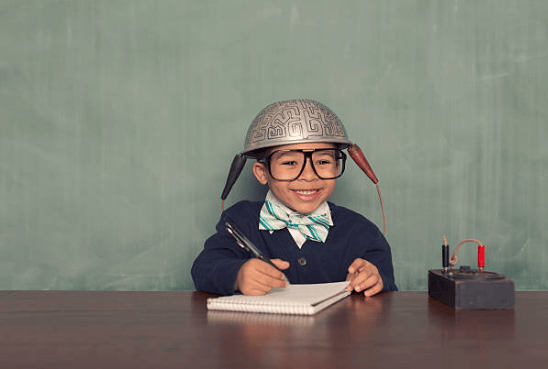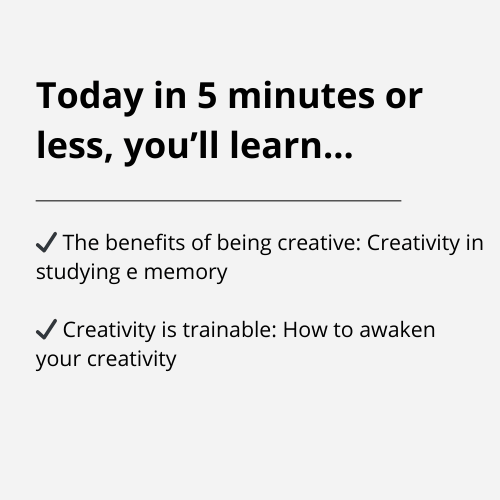- Verve Newsletter
- Posts
- Creativity & study
Creativity & study
"Creativity is intelligence having fun." - Albert Einstein.

Hello Enthusiastic of Knowledge,
How’s everything going?
Today we're talking about creativity in studying, and I'll start this Monday with this quote:
"Creativity is intelligence having fun." - Albert Einstein.
And he was right!
Creativity is the ability, in simple terms, to connect two things that initially seem unrelated, allowing us to think outside the box and create.
Strongly linked to studying as it enables us to connect and reinterpret information, thereby facilitating memorization and, above all, its application.

Creativity is a characteristic demanded by nature.
How would humanity have evolved and survived if it hadn't been ingenious?
How could it have developed a zest for life if it hadn't sought to realize dreams and aspirations?
Imagination and creativity are innate in children and in many young people... then, gradually, they're lost. And this happens because our society teaches children to "color within the lines," to follow rules, to feel "wrong" if they don't do things according to rigid and pre-established settings.
Consequences on learning? Immense.
In recent years, I've had a bit of a problem with creativity.
For a while, for some strange reason, I convinced myself that "I'm not a very creative person."
Or rather; I knew that once upon a time I was a very creative child, but lately it seemed to me that spontaneous ideas were foreign to my mind.
Since I've started training my creativity again, things have drastically changed; my energy, effectiveness, and fun have changed.
So:

Creativity and Learning are, sisters of imagination, and together they release a creative and positive force that many adults have forgotten.
The benefits of being creative: Creativity in studying
Creativity is fundamental in studying. And to notice this, it's enough to take a look at how our memory works:
Our memory is associative.
Memorization occurs when we manage to associate new information with existing information in our mind. This is because our memory is associative.
Our mind constantly associates information with images, sounds, and experiences or memories. When these associations occur, a real neural connection is formed.
Then, gradually, the creation of other, numerous, connections between new and old information is what settles the information, making it part of our knowledge. The more connections pass through the same information, the more solid the information is in our long-term memory.
And what does creativity have to do with all this? As we said, creativity allows us to create connections and associations where there were none before.
In summary, the more creative we are, the easier it becomes to memorize information; creativity is part of the natural learning process.
Being creative not only makes learning faster but also more dynamic and active.
However, the traditional study method often doesn't leave much room for creativity, as if it didn't consider its importance.
We often treat the information we need to memorize as a simple list to learn, forgetting that it's essential to connect this information together to memorize it and then apply it in real life, which should be the ultimate goal of studying.
Our "serious" way of studying isn't actually very effective.
Creativity helps us LEARN the information we study.
Using creativity as the main focus in our study allows us to:
🔸Memorize more quickly, creating connections immediately through the use of images.
🔸Stay more energetic: Creativity excites us. It amuses us. If we let ourselves go with the wave of curiosity without judging our ideas, we have fun.
🔸Reprocessing: Studying with curiosity becomes an exercise that allows us to train our curiosity, making us curious in every field and increasingly fostering the development of ideas.
In short, creating a study method that puts creativity at the forefront would make studying not only extremely more effective and fast, but also fun and exciting.
And I can assure you, since the study method I implemented in the last two years is based precisely on this concept.
If you're interested in starting to study with creativity, with my same strategy, click the link below
Exercise to implement your creativity
Creativity is trainable.
I see it a bit like a muscle; if we train it, it becomes stronger, if we leave it aside, it gradually weakens.
As I was telling you at the beginning, at one point I considered myself a person with little creativity.
And during that period, I was just like that. So used to simply receiving information that I forgot to elaborate and produce ideas.
By retraining my creativity, the first thing I noticed is how much the world starts to shine again. Opportunities appear around every corner, and there's a kind of light of enthusiasm that flows through you, giving a jolt of vitality to reality.
I want to share with you the best exercise that helped me find my creativity again and that I still use several times a week to produce ideas like a train.
20 Brainstorming
The exercise I propose is "20 Brainstorming".
Brainstorming is the best way to reorganize and generate ideas. To train our creativity in particular, I use a specific method: here's how it works:
Goal: start by taking a sheet and writing at the top the problem you want to solve or the theme on which you want to generate ideas, in the form of a question. For example: "How can I earn an extra $500 this month?"
Now start thinking of 20 ideas to answer the question and write them down. Make sure you don't stop before 20 (and if you want to add more, even better). This is because, in the course of the 20 ideas, you'll discard the most obvious ones and really start to use creativity to think beyond your usual mental patterns. Important: don't judge the ideas that come to you during brainstorming; it's not necessary to evaluate if they're feasible, just write them down.
Review the ideas and select which one(s) you want to put into practice.
The beauty of this exercise is discovered only by doing it.
The first ideas are always the most common, but trust me, reaching 20 can be difficult; however, in the end, you'll be amazed at the beautiful and useful ideas you've conceived.
PS: If you brainstorm on how to earn an extra $500 a month, please send it to me, thanks.
Fell free to reply this email
With this exercise, I wish you a good week.
Let go of rigidity and have fun exploring your creativity.
And remember Einstein's words: "Creativity is intelligence having fun."
Talk to you soon 😘
Isa